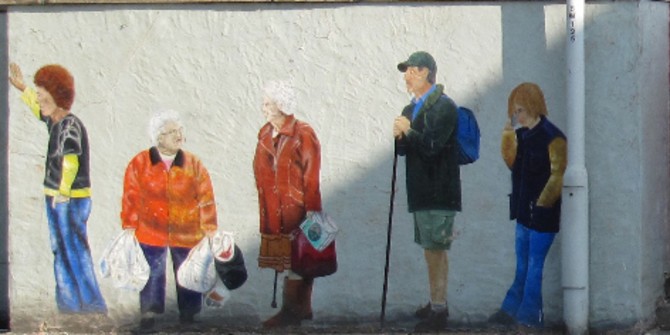Levels of wellbeing increased significantly for individuals who participated in the NHS Volunteer Responders (NHSVR) programme, with effects lasting months after the volunteering period had ended, write Paul Dolan, Christian Krekel, Ganga Shreedhar (LSE), Helen Lee, Claire Marshall (NHS) and Allison Smith (Royal Voluntary Service).
NHS Volunteer Responders (NHSVR) is a scheme established by the NHS in England as part of the COVID-19 response, involving volunteers who carry out simple, non-medical tasks to support people. Delivered by Royal Voluntary Service and GoodSAM, the programme uses micro-volunteering technology to recruit and deploy volunteers. They provide support with transport to medical appointments, collecting shopping, medication, or other essentials, and by making ‘check in and chat’ calls to people who would enjoy regular phone contact and friendly conversation.
In a survey of over 9,000 active participants, the researchers found that even small acts of volunteering boosted participants’ sense of wellbeing and increased feelings of belonging within the local community. Importantly, the authors found that the positive impacts on wellbeing lasted up to three months after the last task had been completed.
Volunteers who carried out a task, for example, rated their life satisfaction as 0.17 points (on a scale of 0-10) higher, than those who had volunteered but not yet carried out a task – an increase which equates to 25% of the size of being employed as opposed to being unemployed.
Existing research has shown that volunteering improves subjective wellbeing for people who give up their time to help others. So far, these reported effects have been correlational, with less understood about how and why volunteering improves wellbeing. This paper aimed to understand and estimate these causal effects, finding that wellbeing significantly increased because of volunteering. In addition, the NHSVR programme provided a strong cost-benefit ratio.
We find that benefits to wellbeing are stronger when volunteers have more social interaction with the direct recipients of their volunteering, or alternatively, have lower entry costs to volunteering. To the extent that stronger benefits, in turn, attract more volunteers or make them volunteer more hours, volunteering environments should be designed in a way that allows for more such social interaction and that makes participating in volunteering easy.
We found some evidence that volunteering generates stronger wellbeing benefits when it is motivated by imperfectly altruistic reasons. It may thus be interesting to experiment with open acknowledgement of volunteers for their volunteering.

Our findings have several policy implications. As its benefits strongly outweigh its costs, the NHSVR programme as a nationwide micro-volunteering scheme could be seen as a model to learn from and to replicate in other countries, during the current and future crises. It could also be run in normal times (for example, as a micro-volunteering system to help the elderly or support vulnerable people in their local communities), not only benefiting volunteers and their direct recipients but also indirectly contributing to higher social cohesion. As it is net-social-welfare-enhancing, a case can be made for public subsidies to organisations that promote volunteering, especially those with high benefits to direct recipients.
It is unclear what the long-run impacts of volunteering on wellbeing are. Do volunteers who stop volunteering continue to generate wellbeing or is there a return to baseline? Do volunteers who continue to volunteer hedonically adapt to their activities, and at some point, stop generating benefits (and then presumably give up volunteering)? Once the crisis is over, do volunteers continue to volunteer, by substituting to alternative activities elsewhere?
Nonetheless, the results in this paper are strongly suggestive of significant, sizeable and, to some extent, sustainable, returns to wellbeing from volunteering. They further highlight the need for policy-makers to not only encourage volunteering for the benefit of others, but also to make salient the considerable personal benefits that come from helping others.
This post represents the views of the authors and not those of the COVID-19 blog, nor LSE.





